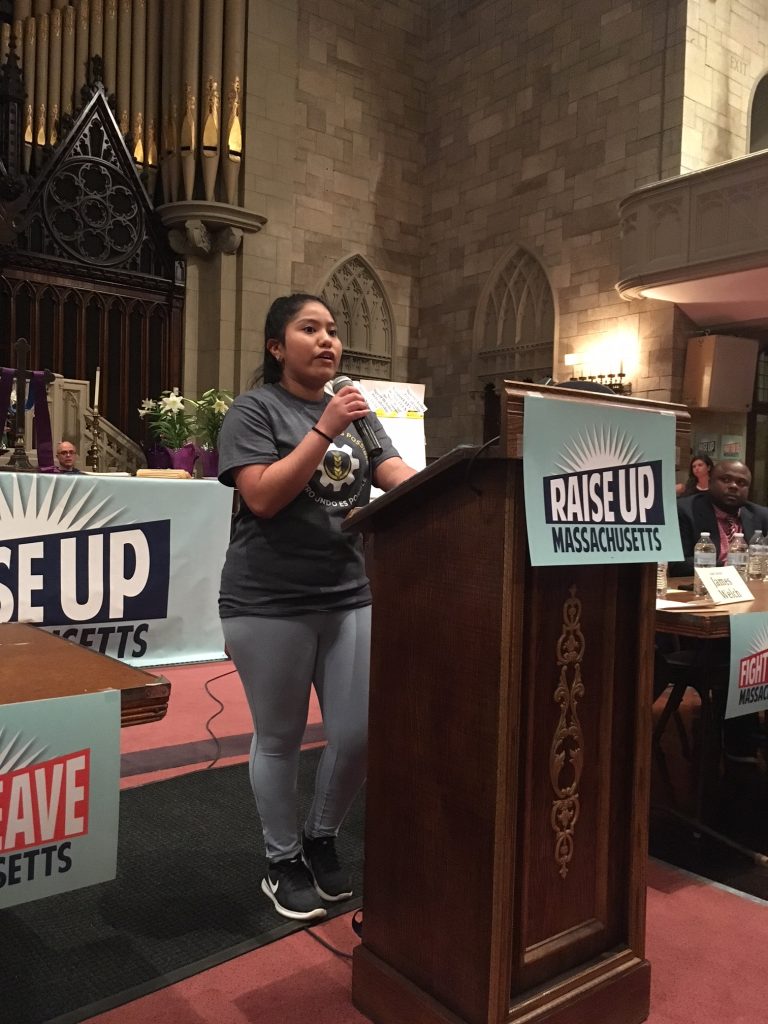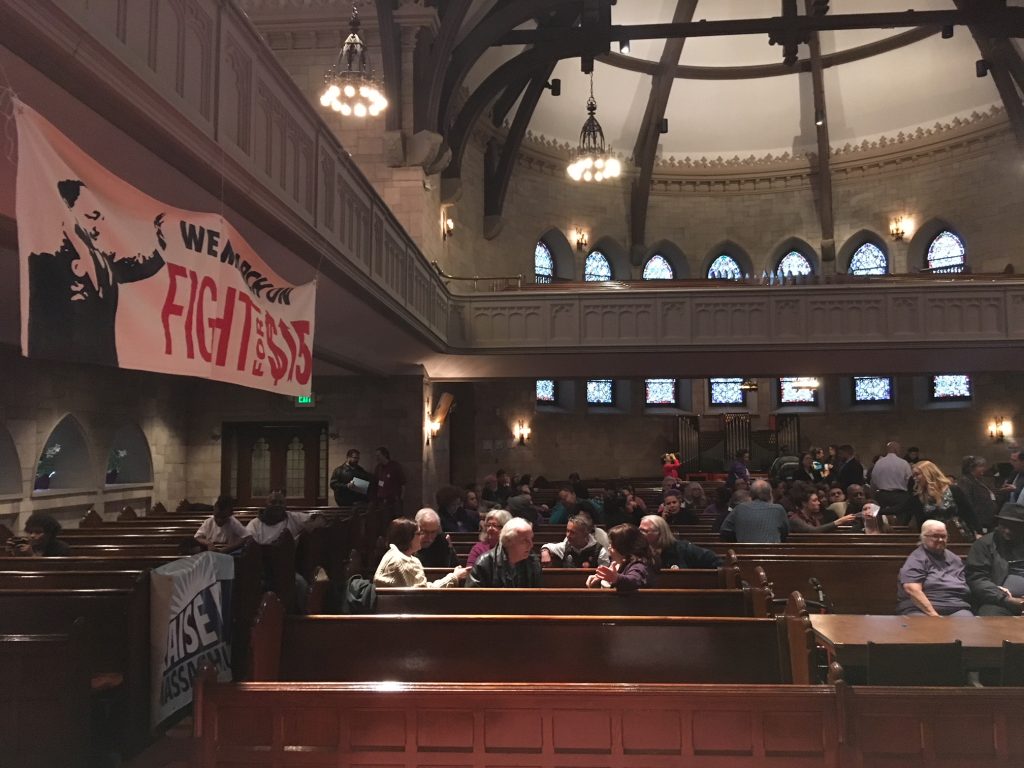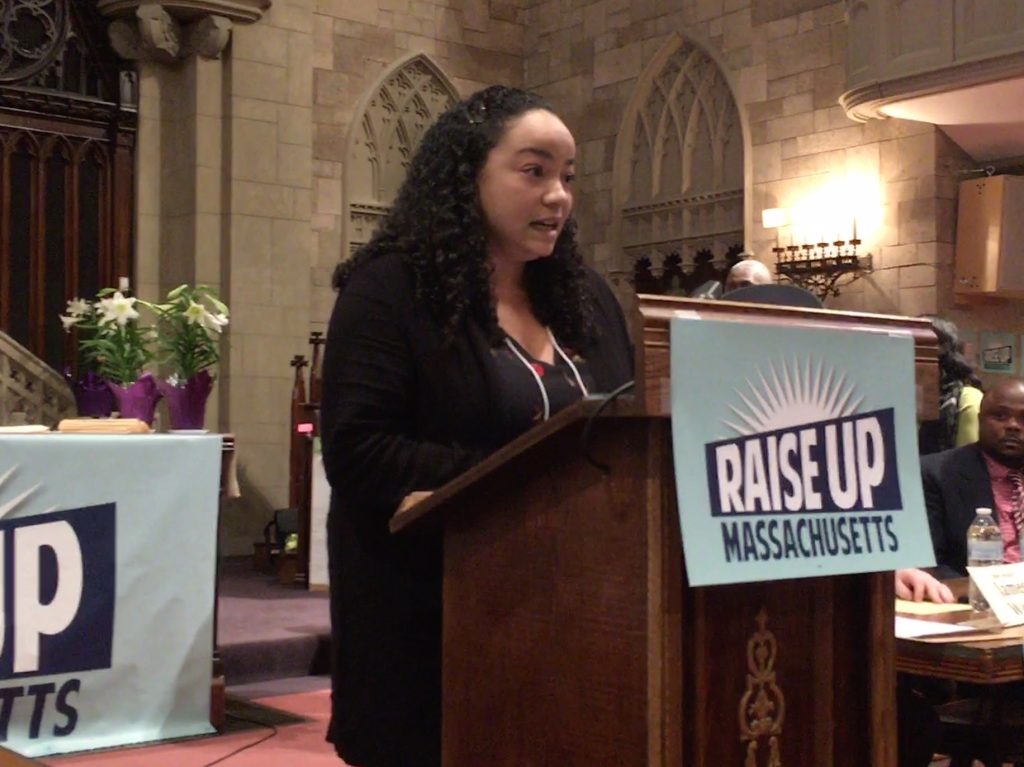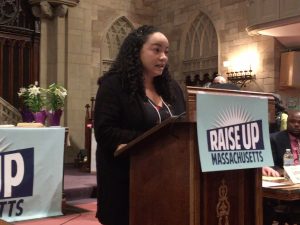
Alicia Fleming speaking at Raise Up Massachusetts community briefing in Springfield. Photo by Meg Bantle.
For Alicia Fleming of Chicopee, getting paid family and medical leave isn’t about politics, it’s about survival.
“As a single mom, paid family leave is of the utmost importance to the well being of my family,” Fleming said.
Fleming told a room of about 150 people at the South Congregational Church in Springfield on March 28 about the year her mother passed away, and about how the time she had to take off of work cost her money she needed for heat and hot water that year.
“I mourned her in a house that varied from 10 to 40 degrees, and that was for months,” Fleming said.
Fleming now fears that if her young son ever needs medical care it will take her away from work, because she wouldn’t be able to afford the time off.
Fleming’s story was one of several testimonies given on March 28 in support of both paid family and medical leave and raising the minimum wage in front of several Western Massachusetts legislators. The community briefing is one of seven similar meetings that Raise Up Massachusetts is organizing with partners across the state to advocate for two of their ballot initiatives in 2018: paid family and medical leave and a $15 minimum wage. You can read more details about these ballot initiatives in this Valley Advocate article from January.
“It’s a chance for legislators to hear from their constituents about why they support these bills,” said Stephen Crawford, a spokesperson for Raise Up Massachusetts.
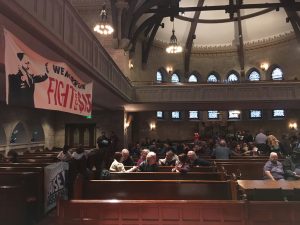
People gather at the South Congregational Church in Springfield for the Raise Up Massachusetts community briefing. Photo by Meg Bantle.
The initiative petition process is the process by which citizens of Massachusetts can gather signatures to get specific legislation on the ballot. But before the ballot initiatives make it to the ballot in November, the state Legislature has the opportunity to take up and pass the initiatives itself.
“It really ought to be resolved in the Legislature instead of on the ballot,” said Senator Stanley Rosenberg, who was invited to Tuesday’s event but did not attend.
Rosenberg said that because ballot questions are usually not amended after they are voted on, it is easier for the Legislature to fine tune the bills in question before they get sent to the ballot. For Rosenberg, issues like increasing the minimum wage or eliminating the state sales tax (which is another ballot initiative not proposed by Raise Up Massachusetts) are too complicated to be decided solely on the ballot.
To encourage support of these two pieces of legislation amongst Western Mass representatives, Raise Up Massachusetts brought together a coalition of over a dozen local activist groups and unions to speak on Tuesday, including the Pioneer Valley Workers Center, Pioneer Valley Project, Neighbor to Neighbor, Planned Parenthood of Massachusetts.
“It’s getting the momentum of the community together to advocate for these bills on Beacon Hill,” Crawford said.
Michael Archibald is the owner of Collective Home Care in Hatfield. Archibald was the only business owner to speak, and emphasized that home health care is essential for seniors and for allowing other people in the community to continue working when a family member needs care.
“(Home health care professionals) need support, respect, and a living wage,” Archibald said.
Gilbert Dillard of Springfield spoke as a representative of SEIU Community Action. As a veteran of the United States Army, Dillard said that supporting new parents when they are coming from the military is essential.
“All too often families are maybe two paychecks away from a disaster,” Dillard said.
Raise Up Massachusetts’ proposed paid leave legislation provides workers with 12 to 16 weeks of job-protected paid leave care. The Minimum wage legislation would increase minimum wage by one dollar per year until it reached $15 per hour, and then it would increase proportionally to the cost of living. The master of ceremonies for the night Pablo Ruiz, from SEIU Community Action, emphasized that Raise Up Massachusetts was fighting for these two initiatives to pass the legislature without “carve-outs,” or specific groups that would be left out of the legislation like teens and small businesses.
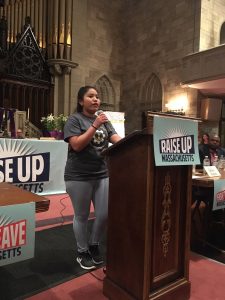
Hodaliz Borrayes speaking at Raise Up Massachusetts community briefing in Springfield. Photo by Meg Bantle.
One teen, Hodaliz Borrayes, 18, spoke on Tuesday about how the minimum wage increase would affect her family. Both Borrayes and her mother work long hours in agriculture, but Borrayes said that the pay isn’t enough.
“I’m a teenager and I don’t have time to hang out with my friends,” Borrayes said. “The $15 minimum wage would change a lot of things for us, but it wouldn’t be enough.”
Rosenberg said that he is totally in favor of paid medical and family leave, but that the minimum wage raise, specifically raising the minimum wage for teens and tipped workers, hadn’t been discussed yet. Rosenberg said that the two initiatives could pass the Legislature as a package with another initiative to eliminate the state sales tax.
Other representatives who attended the meeting included Senator James Welch, Representative Solomon Goldstein-Rose of Amherst, Representative Carlos Gonzales of Springfield, and a representative from Representative Bud Williams’ office. All four support the two initiatives and pledged to not support carve-outs and to sign a letter to senior leadership encouraging them to do the same.
“I’m happy to say that I still live in the neighborhood I grew up in,” said Gonzales. “A poor neighborhood … I know that (paid family and medical leave) is a better investment for us as a government.”
Crawford said that Raise Up Massachusetts is optimistic about how the legislation will fare on Beacon Hill.
“We know that these are extremely popular issues with the voters,” Crawford said. “We believe that’s a strong enough reason for legislators to act.”
Meg Bantle can be reached at mbantle@valleyadvocate.com.

